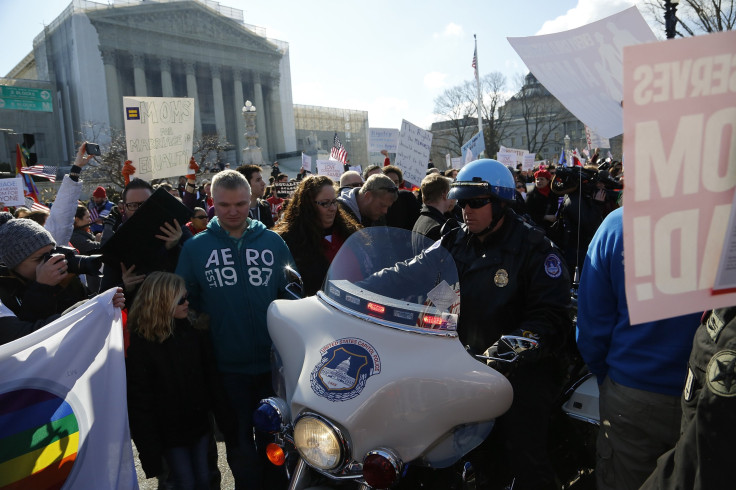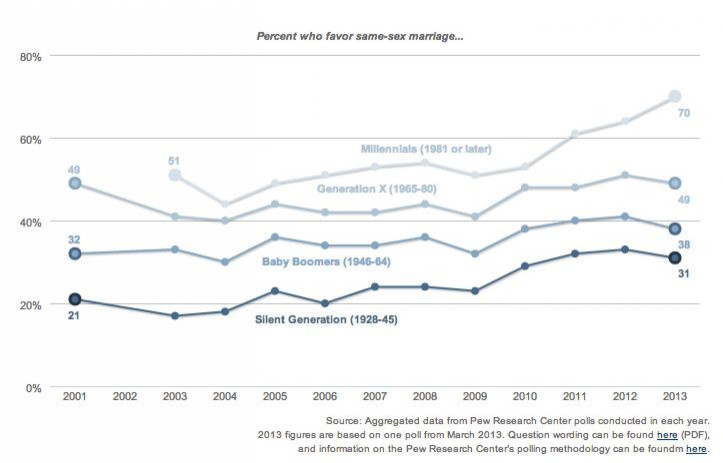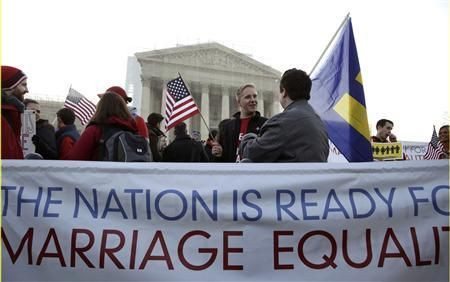Supreme Court Gay Marriage Hearings: Oral Arguments Begin

1:30 p.m. The audio of Tuesday's oral arguments in Hollingsworth v. Perry has been released by the Supreme Court. Listen below:
The court does not have the five votes necessary to either decide the Proposition 8 case in any way, according to an immediate reaction from SCOTUSblog. Several of the justices, including Chief Justice John Roberts, appear to seriously doubt whether the petitioners defending the law have any "standing" to appeal the lower court decision that invalidated it.
"The justices seem divided on the constitutionality of Proposition 8 on ideological lines, four to four – i.e., all the members other than Justice Kennedy. For the more liberal members of the Court, there was no clarity on how broadly they would rule," the blog reports.
Because Kennedy appears unlikely to support either side with a fifth vote -- he repeatedly asserted that social science has not yet progressed to a point to truly note how gay marriages ultimately effect children -- and suggested the case should be dismissed.
Right now there are two likely possibilities: Either a majority of the court could decide the petitioners lack standing, which would leave in place the district court decision invalidating Proposition 8, or it could simply dismiss the case because of an inability to reach a majority.
11:45 a.m. Oral arguments in the Proposition 8 case have ended. SCOTUSblog reports the Supreme Court will not uphold or strike down Proposition 8 because Justice Kennedy believes it is "too soon" to rule on same-sex marriage. That means Proposition 8 will stay invalidated, as per lower court rulings.
Arguments done. #scotus won’t uphold or strike down #prop8 bc Kennedy thinks it is too soon to rule on #ssm. #prop8 will stay invalidated.
- SCOTUSblog (@SCOTUSblog) March 26, 2013
11:35 a.m. Proposition 8 backers are reportedly centering their argument heavily around the fact that the ultimate goal of marriage is procreation, according to a report from The Wall Street Journal. Because same-sex couples obviously cannot create children together, that apparently makes their claim to marriage less valid. Justices Stephen Breyer, Elena Kagan and Ruth Bader Ginsburg are reportedly skeptical of the argument that gay marriage truly interferes with the purported goal of "procreation." Ginsburg pointed out that the court's 1987 decision in Turner v. Safley ruled prison inmates have the right to marry, even though there was no prospect for procreation while they are incarcerated.
11:20 a.m. SCOTUSblog appears to be backtracking on its initial report. According to recent tweets from a correspondent, Justice Anthony Kennedy -- viewed as a key swing vote in this case -- appears to be "very uncomfortable" with striking down Proposition 8, and even suggested dismissing the case. At this time, there does not appear to be the five votes necessary to overturn the law.
Breaking: key vote Kennedy VERY uncomfortable striking down #prop8. Suggests dismissing case. Would leave in place 9th Cir pro-#ssm ruling.
- SCOTUSblog (@SCOTUSblog) March 26, 2013
11:15 a.m. The Washington Post’s WonkBlog argues that, no matter how the court decides on Tuesday’s cases, statistics indicate marriage equality will ultimately win. The blog posted a series of graphs (including the one below) depicting how support for gay marriage is growing steadily across all almost every demographic. The fastest growing demographic is also one of the youngest – Millenials. According to a recent poll from the Pew Forum on Religion and Public Life, 70 percent of young Americans now support same-sex marriage.

11 a.m. Californian’s regret passing Propositon 8, according to a new SurveyUSA poll.
Sixty-seven percent of Golden State resident now believe same-sex couples deserve the legal benefits of marriage, while only 30 percent believe those benefits should be limited solely to heterosexual unions.
A majority of Californians – 52 percent – also said they believed the Supreme Court should uphold lower court rulings that found Proposition 8 unconstitutional.
10:55 a.m. SCOTUSblog's first update of the day predicts Proposition 8 is unlikely to upheld, positive news for marriage equality advocates.
Breaking: 1st update- #prop8 unlikely to be upheld; either struck down or #scotus won’t decide case. More in 30 mins.
- SCOTUSblog (@SCOTUSblog) March 26, 2013
The U.S. Supreme Court this week will hear two landmark cases that could change the scope of both marriage law, and potentially sexual discrimination, across the nation.
The first case before the nation’s high court concerns California’s anti-gay Proposition 8, a ballot initiative that banned gay marriage in the state. The court, if it overturns the law, could potentially declare that banning same-sex couples from marriage is a violation of their constitutional right to equal protection.
On Wednesday the justices will hear a challenge to the federal Defense of Marriage Act, or DOMA, which bans federal recognition and benefits for legally married same-sex couples. The high-profile case, technically known as Windsor v. United States, was filed by the American Civil Liberties Union on behalf of Edith Windsor, who was told to pay more than $360,000 in federal estate taxes after her wife of 40 years passed away – if they had been a heterosexual couple, she would not have had to pay any taxes.
Oral arguments began at 10 a.m. Lives streams from outside of the Supreme Court show thousands of people gathered in the nation’s capital to witness history in the making, no matter what side of the argument they may stand on.


At about 1.pm. the court will release audio recordings of the arguments on its website.
© Copyright IBTimes 2024. All rights reserved.





















